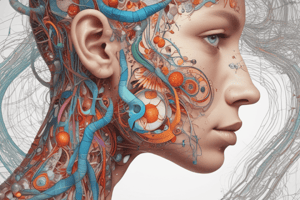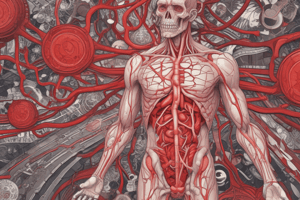Podcast
Questions and Answers
Which of the following is a behavioral response to cold temperatures?
Which of the following is a behavioral response to cold temperatures?
- Vasodilation
- Erection of hair (correct)
- Hyperventilation
- Sweating
What is the primary mechanism of heat transfer in a counter-current heat exchanger?
What is the primary mechanism of heat transfer in a counter-current heat exchanger?
- Conduction (correct)
- Evaporation
- Convection
- Radiation
What is the primary site of shivering in the body?
What is the primary site of shivering in the body?
- Medulla oblongata
- Posterior hypothalamus (correct)
- Anterior hypothalamic preoptic area
- Primary motor center
Which hormone stimulates glycogenolysis and lipolysis in response to cold temperatures?
Which hormone stimulates glycogenolysis and lipolysis in response to cold temperatures?
What is the effect of thyroxin on the body's metabolic rate?
What is the effect of thyroxin on the body's metabolic rate?
What is the effect of cortisol on blood glucose levels?
What is the effect of cortisol on blood glucose levels?
What is the primary mechanism of heat loss in cold environments?
What is the primary mechanism of heat loss in cold environments?
Which of the following is a physiological response to cold temperatures?
Which of the following is a physiological response to cold temperatures?
What is the primary mechanism by which the body reduces heat gain?
What is the primary mechanism by which the body reduces heat gain?
What is the effect of vasodilatation of skin blood vessels on heat loss?
What is the effect of vasodilatation of skin blood vessels on heat loss?
What is the composition of primary sweat secreted by the acini?
What is the composition of primary sweat secreted by the acini?
What is the effect of evaporation of 1ml of sweat on the body's heat loss?
What is the effect of evaporation of 1ml of sweat on the body's heat loss?
What is the characteristic of sweating in acclimatization to hot weather?
What is the characteristic of sweating in acclimatization to hot weather?
What is the definition of fever?
What is the definition of fever?
What is the role of aldosterone in the sweating mechanism?
What is the role of aldosterone in the sweating mechanism?
What is the characteristic of cold sweat?
What is the characteristic of cold sweat?
What is the recommended treatment for sun stroke?
What is the recommended treatment for sun stroke?
What is the primary cause of tissue degeneration in cases of heat stroke?
What is the primary cause of tissue degeneration in cases of heat stroke?
What is the effect of hyperthermia on the central nervous system?
What is the effect of hyperthermia on the central nervous system?
What is the effect of increased body temperature on heart rate?
What is the effect of increased body temperature on heart rate?
What is the effect of vasodilation on blood pressure?
What is the effect of vasodilation on blood pressure?
What is the effect of hypothermia on heart rate?
What is the effect of hypothermia on heart rate?
What is the effect of hyperthermia on respiratory rate?
What is the effect of hyperthermia on respiratory rate?
What is the effect of frostbite on digits and lobes of ears?
What is the effect of frostbite on digits and lobes of ears?
Flashcards are hidden until you start studying
Study Notes
Regulation of Body Temperature
- Two mechanisms to regulate body temperature:
- Decrease heat gain: by inhibiting mechanisms that cause heat production and behavioral responses such as apathy and anorexia
- Increase heat loss: through vasodilatation of skin blood vessels and sweating
Sweating
- Sweat is a hypotonic secretion of NaCl
- Center: preoptic nuclei in the anterior hypothalamus
- Supply: eccrine sweat glands are supplied by sympathetic cholinergic fibers (blocked by atropine)
- Sweat secretion: an active process in which the acini secrete isotonic sweat, but NaCl is gradually reabsorbed by the ducts to make it hypotonic
- Cooling effect of sweat: each 1ml of evaporated sweat removes 0.6 K Cal
- Sweat starts at environmental temperature of 32°C
- Dribbling alone without evaporation does not lead to loss
Acclimatization of Sweating
- Acute exposure to hot weather: a person sweats 700 ml/h and loses 15-30 gm NaCl/day
- After exposure to hot weather for 6 weeks: a person sweats 2000 ml/h and loses 3-5 gm NaCl/day
- Cold sweat: an emotional sweating even with cold and vasoconstriction
Disorders of Temperature Regulation
- Fever (pyrexia): hyperthermia caused by resetting of the setpoint of the hypothalamus to a higher level
- Counter-current heat exchanger: directs blood to deep veins, which run parallel to the arteries, to conserve heat
Behavioral Responses
- Putting on heavy clothes
- Curling the body to decrease surface area
- Erection of hair as an insulator for cold (sympathetic effect)
Increase in Heat Production
- Shivering: involuntary rhythmic contractions of the skeletal muscle to produce large amounts of heat
- Center: posterior hypothalamus in the primary motor center for shivering
- Shivering can be prevented by curare (neuromuscular blocker)
Hormonal Thermogenesis
- Adrenaline:
- Stimulates the metabolic rate
- Causes cutaneous vasoconstriction
- Stimulates glycogenolysis
- Stimulates lipolysis (of depot fat)
- Thyroxin: stimulates the Thyroid Stimulating Hormone (TSH) to secrete thyroxin hormone, which increases the basal metabolic rate (BMR)
- Cortisol: stimulates the blood glucose and metabolic rate
Effect of Exposure to Heat
- Exposure to heat stimulates the hypothalamus to regulate body heat balance
- Loss of fluids and sweat may lead to circulatory shock and tissue degeneration
- Treated by: immediate cooling of the body, sponge with alcohol, and antipyretic drugs
Sun Stroke
- Beside sweating and dehydration, damage of brain tissue by direct sun rays leads to severe fever
- Treated by immersion in ice bath and drinking saline
Physiological Changes Associated with Hyperthermia
- Central Nervous System:
- At first, hyperthermia stimulates the CNS leading to tremors and convulsions
- Above 41°C, malfunction of CNS occurs leading to loss of reflexes and coma
- Cardio Vascular System:
- Increase heart rate by 10 beats/min for each 1°C
- Increase in body temperature due to direct stimulation of SAN or cardio-accelerator centre
- Increase cardiac output due to vasodilatation of peripheral arterioles
- Increase systolic blood pressure and decrease diastolic blood pressure
- Respiration:
- Increased respiratory rate by stimulation of the central and peripheral chemoreceptors
Hypothermia
- A drop of body temperature to a low level with slow metabolic and physiologic processes
- Causes:
- Exposure to extreme cold water (ice water) for 20 minutes
- Frost bite: exposure to extreme cold weather leading to freezing in lobes of ears and digits of hands and feet
- Impaired regulation of body temperature by the hypothalamus, leading to sleepiness and even coma
Studying That Suits You
Use AI to generate personalized quizzes and flashcards to suit your learning preferences.





